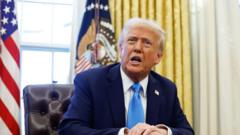Trump's decision to sanction the ICC has reignited debates over international justice, U.S. sovereignty, and the implications for global law enforcement.
Trump Imposes New Sanctions on International Criminal Court

Trump Imposes New Sanctions on International Criminal Court
President Trump's executive order targets ICC officials amid ongoing tensions concerning war crime allegations.
In a decisive move reflective of his administration's stance on international organizations, President Donald Trump has signed an executive order that enforces sanctions against the International Criminal Court (ICC). This action comes in the wake of the ICC's issuance of arrest warrants for Israeli officials, including Prime Minister Benjamin Netanyahu and Defence Minister Yoav Gallant, based on allegations of war crimes in Gaza—claims that Israel strongly refutes.
The executive order imposes financial and visa restrictions on individuals, including their family members, involved in ICC investigations that target American citizens or allies. The White House emphasized that the ICC's actions represent an unjust focus on the U.S. and its partnership with Israel, asserting that the ICC creates "shameful moral equivalency" between Israel and Hamas by simultaneously issuing arrest warrants for leaders of both sides.
Earlier in the year, the U.S. House of Representatives passed a bill affirming sanctions against the ICC after the arrest warrants drew international attention. The court's response was swift, voicing regret over attempts to undermine its impartiality and judicial independence.
While the ICC was established in 2002 to address severe human rights violations—inspired by atrocities from the Yugoslav Wars and the Rwandan genocide—the U.S. has consistently disputed the ICC's authority over American personnel. In the past, Trump has made similar moves to penalize ICC officials who probed alleged war crimes by U.S. forces in Afghanistan, an initiative that reaffirmed the administration's skepticism toward international legal jurisdictions.
Responding to the latest sanctions, the ICC described these actions as a "unacceptable attempt" to obstruct the rule of law. Underlining the ongoing jurisdictional conflict, President Biden has also criticized the ICC's warrants, aligning with Trump's stance on the perceived imbalance in targeting Israeli officials against the backdrop of ongoing conflict with Hamas.
As discussions surrounding the legitimacy and effectiveness of the ICC continue, the implications of the U.S.'s non-participation in the Rome Statute and its recent sanctions will pose challenges for international law and the future of global judicial processes.






















